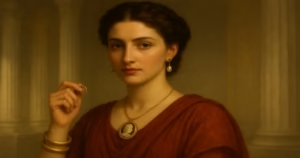Enter a realm where crowns shine in the light, armies fight on foggy fields, and brave rulers hold the fate of kingdoms. Medieval kings were not just rulers. They also made history, were visionaries, and were soldiers. Their choices built nations and shaped their futures. They formed alliances, grew empires, and created legendary stories for the future. These tales still inspire today.
You can find them in dusty archives, engaging historical novels, or Norse Books that blend myth with reality. In this journey, we’ll explore the lives of kings from a fascinating era. We’ll look at their triumphs and downfalls. We’ll focus on their battles, thrones, and the legacies they created.
What Was the Medieval Period? Setting the Stage for Kings
Okay, friends, before we meet the stars—medieval period kings—let’s talk about the time they lived in. The medieval period, or Middle Ages, ran from about 500 to 1500 AD. It started after the Roman Empire fell and ended around the Renaissance. Europe was a big puzzle then. It had kingdoms, castles, and knights. There were many changes too, especially in medieval England, where power struggles, battles, and royal tales shaped history.
Why call it “medieval”? It means “middle ages,” between ancient times and the modern world. During this era, medieval period kings were the big bosses. They ruled lands, led armies, and made laws. But it wasn’t easy—there were wars, plagues, and power struggles.
Key facts about the medieval period:
- Early Middle Ages (500-1000 AD): Known as the Dark Ages. This time saw many invasions and many small kingdoms.
- High Middle Ages (1000-1300 AD): Life improved. Trade expanded, castles appeared, and kings built larger empires.
- Late Middle Ages (1300-1500 AD): Kings had several difficulties. Their rule was put to the test during the Hundred Years’ War and the Black Death.
- Daily Life: Most people were farmers, but kings lived in castles with feasts and tournaments.
This time brought us legends like King Arthur and rulers such as King Jhon. He might be real or not. Medieval kings sparked tales that still echo today.
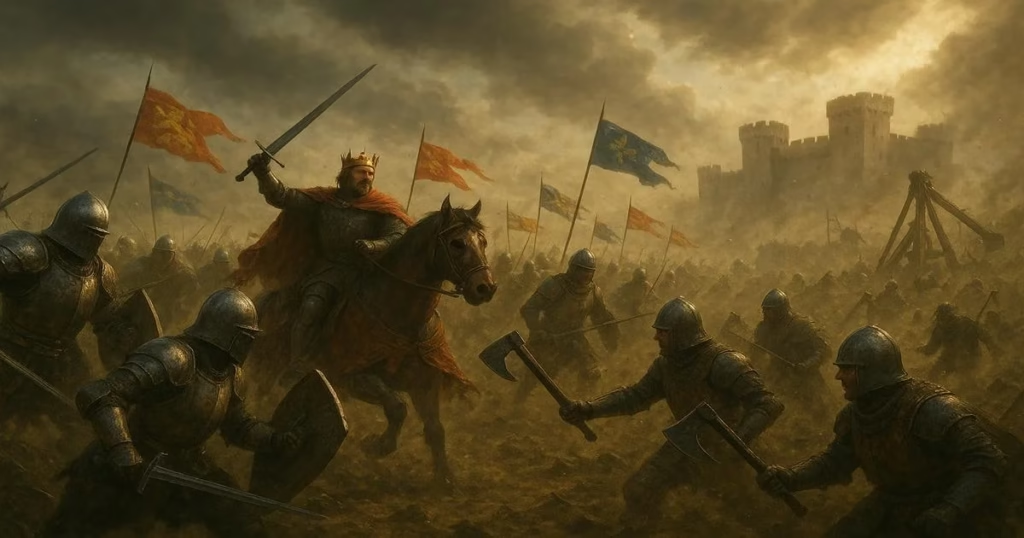
The Role of Medieval Period Kings: More Than Just Wearing a Crown
Now, picture a king on his throne—what did he actually do? Medieval period kings were like CEOs of their kingdoms. They had power from God (called divine right), but they had to keep nobles, the church, and people happy. A good king was a warrior, judge, and leader all in one.
What made medieval period kings special? They protected their land, made laws, and spread religion. But bad kings caused wars or lost power. Let’s break it down.
Duties of medieval period kings:
- Leading Armies: Many medieval period kings fought in battles to expand land or defend borders.
- Making Laws: They created rules for justice, taxes, and trade.
- Managing Money: Kings collected taxes and spent on castles, churches, and feasts.
- Religion: Close ties with the church—kings were crowned by popes or bishops.
- Family Matters: Marriages allied kingdoms, and heirs kept the line going.
Fun fact: Medieval kings traveled on “progresses.” They visited towns to show power and hear complaints. No sitting around all day!
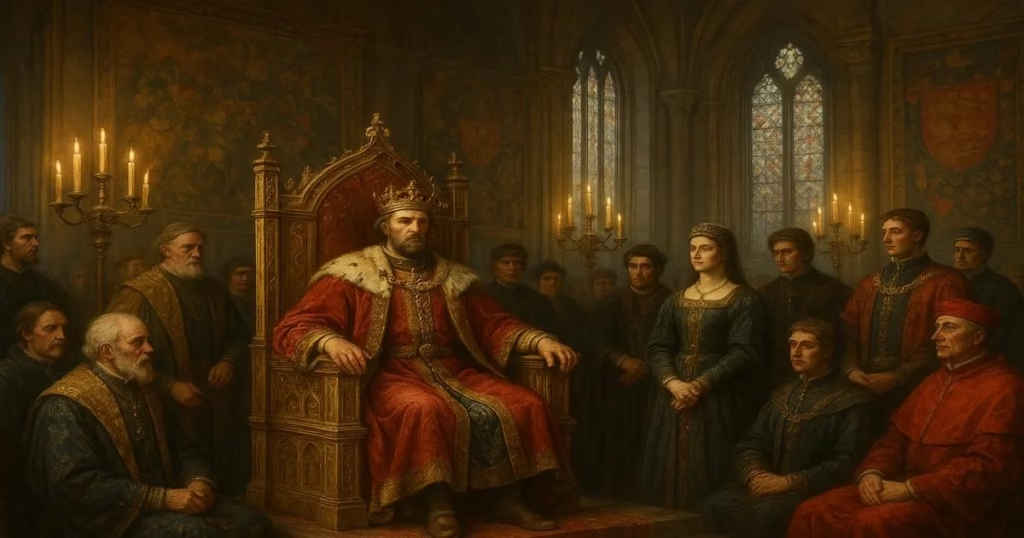
Famous Medieval Period Kings: Heroes and Legends from Europe
Class, time for the exciting part—meeting some star medieval period kings! We’ll focus on Europe, where most stories come from. These kings ruled during different times, but all left big marks. I’ll share their stories like short tales, with bullet points for key facts.
Charlemagne: The Father of Europe (768-814 AD)
Imagine a king who united half of Europe—that’s Charlemagne, one of the greatest medieval period kings. Born in 742 AD, he was King of the Franks and later Holy Roman Emperor. He loved learning and building, turning his kingdom into a powerhouse.
Why Charlemagne rocks as a medieval period king:
- Conquests: They grew from France to Germany and Italy, battling Saxons and Lombards.
- Education Push: Started schools and copied books, sparking the Carolingian Renaissance.
- Religion: Spread Christianity, even forcing conversions (not cool by today’s standards).
- Legacy: Pope-crowned Emperor in 800 AD. This event inspired future kings of the medieval period.
Charlemagne died in 814 AD, but his empire influenced Europe for centuries. He’s like the grandpa of modern nations!
Alfred the Great: England’s Defender (871-899 AD)
Next up, Alfred the Great, a medieval period king who saved England from Vikings. Born in 849 AD, he was King of Wessex. Alfred wasn’t just a fighter—he was smart, building forts and schools.
Cool things about this medieval period king:
- Viking Battles: Won at Edington in 878 AD, making peace with Danelaw.
- Laws and Learning: Created a law code and translated books into English.
- Navy Builder: Started England’s first navy to stop Viking ships.
- Legacy: The only English king to be crowned “the Great” was the United Anglo-Saxons.
Alfred died in 899 AD, but his dream of a united England lived on. He’s a hero in medieval period kings stories!
William the Conqueror: The Norman Invader (1066-1087 AD)
Imagine a battle that changed England forever. That’s William the Conqueror, an important king from the medieval period. Born in 1028 AD, he was Duke of Normandy before conquering England in 1066 AD at Hastings.
What made William a standout medieval period king:
- 1066 Conquest: Overcame Harold Godwinson, becoming the first Norman king of England.
- Domesday Book: Surveyed all land and people for taxes—big data medieval style!
- Castles Everywhere: Built over 80 castles, like the Tower of London, to control the land.
- Legacy: Brought French words and customs to English, shaping language and law.
William died in 1087 AD from a riding accident, but his Norman rule transformed England.
Richard the Lionheart: The Crusader King (1189-1199 AD)
Now, a king famous for bravery—Richard the Lionheart, an adventurous medieval period king. Born in 1157 AD, he ruled England but spent most time on Crusades.
Highlights of this medieval period king:
- Third Crusade: Fought Saladin, capturing Acre but not Jerusalem.
- Warrior Skills: Known for courage, even forgiving the boy who shot him (though he died from the wound).
- England Management: Left brother John in charge, leading to Robin Hood legends.
- Legacy: Symbol of chivalry, inspiring stories of medieval period kings.
Richard died in 1199 AD, arrow wound turning deadly. He’s remembered as a hero, not an administrator.
Edward I: The Hammer of the Scots (1272-1307 AD)
Edward I, often known as Longshanks, was a tall, hardy monarch from the Middle Ages. Born in 1239 AD, he ruled England and tried to conquer Scotland and Wales.
Key moments for this medieval period king:
- Conquered Wales: Built castles like Caernarfon to hold it.
- Scottish Wars: Fought William Wallace and Robert the Bruce, earning his nickname.
- Model Parliament: Called in 1295, it included commoners. This was an early step toward democracy.
- Legacy: Strengthened English law and borders, but harsh on enemies.
Edward died in 1307 AD, heading to battle. His son Edward II couldn’t match him.
Louis IX: The Saint King of France (1226-1270 AD)
Switching to France, Louis IX was a pious medieval period king. Born in 1214 AD, he ruled from age 12 and became Saint Louis.
Why he’s among top medieval period kings:
- Crusades: Led two, captured once but ransomed.
- Justice Reforms: Created fair courts, banning trials by combat.
- Building Projects: Commissioned Sainte-Chapelle for relics.
- Legacy: Canonized in 1297, only French king sainted.
Louis died in 1270 AD on Crusade. His goodness set him apart.
Frederick II: The Wonder of the World (1194-1250 AD)
Frederick II, Holy Roman Emperor, was a smart medieval period king. Born in 1194 AD, he ruled Sicily and Germany.
Fascinating facts about this medieval period king:
- Multilingual Genius: Spoke six languages, loved science and animals.
- Crusade Without War: Negotiated Jerusalem’s return peacefully.
- Falconry Book: Wrote “The Art of Hunting with Birds,” still used.
- Legacy: Called “Stupor Mundi,” wonder of the world.
Frederick died in 1250 AD, but his curiosity inspired Renaissance ideas.
More Medieval Period Kings: Quick Spotlights
Class, we’ve covered stars, but many medieval period kings deserve mentions. Here’s a quick list:
- Otto the Great (912-973 AD): United Germany, became Holy Roman Emperor.
- Hugh Capet (940-996 AD): Began the French Capetian dynasty.
- King Henry III (1207-1272 AD): Built Westminster Abbey, but faced barons’ revolt.
- Philip II Augustus (1165-1223 AD): Doubled France’s size, beat England.
- Casimir III the Great (1310-1370 AD): Made Poland strong, founded university.
These medieval period kings show diversity in ruling styles.
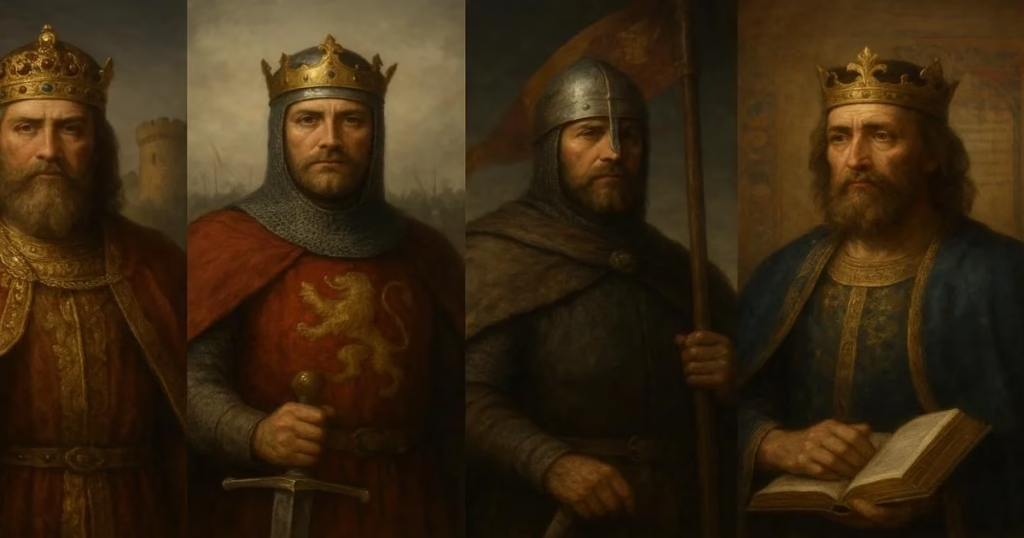
Daily Life of Medieval Period Kings: Not All Feasts and Fun
Imagine waking as a medieval period king—sounds glamorous? It was hard work! Medieval period kings had busy days with duties, but some luxury too.
Typical day for medieval period kings:
- Morning Prayers: Started with chapel, as religion was big.
- Council Meetings: Discussed laws, taxes with advisors.
- Hunting or Training: Kept fit with hunts or jousts.
- Feasts: Big meals with nobles, showing wealth.
- Justice Time: Heard cases, gave judgments.
Medieval period kings traveled a lot, visiting lands to keep control. They had servants, but threats like assassins or rebellions kept them alert.
Power and Administration: How Medieval Period Kings Ruled
Medieval period kings didn’t rule alone—they had systems. Feudalism meant lords swore loyalty for land.
How medieval period kings managed power:
- Royal Court: Advisors, chancellors handled daily stuff.
- Taxes and Laws: Collected money for armies, made rules like Magna Carta.
- Church Alliance: Popes crowned kings, but fights like with Henry II happened.
- Army Command: Led wars, like medieval period kings in Crusades.
- Marriage Politics: Wed for alliances, expanding kingdoms.
This setup helped medieval period kings control vast lands.
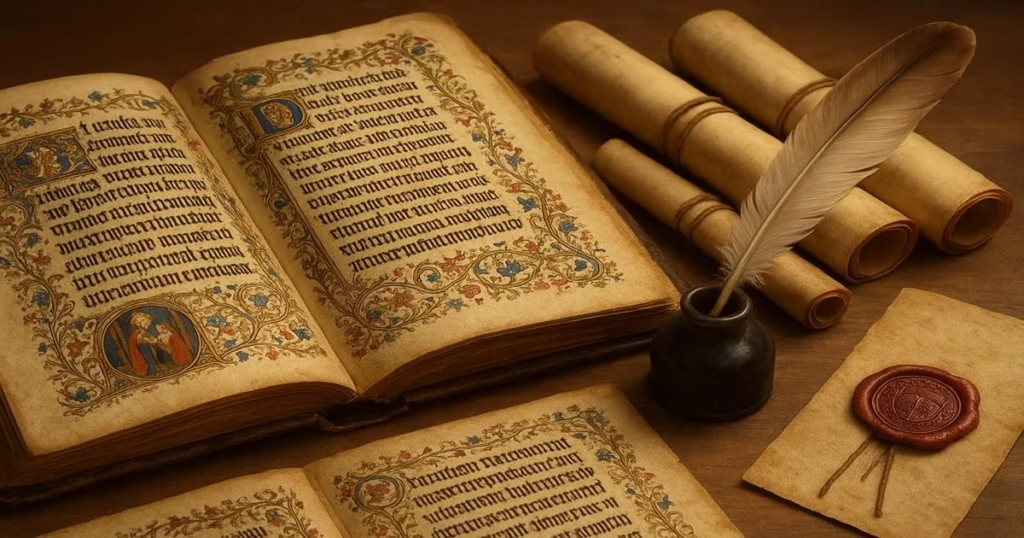
Wars and Conquests: The Battlefield Side of Medieval Period Kings
Wars defined many medieval period kings. They fought for land, honor, religion.
Famous wars involving medieval period kings:
- Crusades: Richard the Lionheart vs Saladin.
- Hundred Years’ War: English medieval period kings like Edward III vs France.
- Norman Conquest: William’s 1066 victory.
- Scottish Independence: Robert the Bruce vs Edward I.
- Reconquista: Spanish medieval period kings vs Moors.
- Civil War & Wars of the Roses: Rival royal families battled for England’s crown, shaping the future of the monarchy.
These battles shaped borders, like how medieval period kings built empires.
The Legacy of Medieval Period Kings: What They Left Behind
Class, medieval period kings‘ impact lasts. They built nations, laws, cultures.
Legacies of medieval period kings:
- Legal Systems: Magna Carta from John influenced rights.
- Architecture: Castles and cathedrals, such as Westminster from Henry III.
- Languages: Norman French mixed with English after William.
- Art and Literature: Patronage inspired tales like Arthurian legends.
- Modern Nations: Charlemagne’s empire led to France, Germany.
In 2025, we see their influence in movies, books, festivals celebrating medieval period kings.
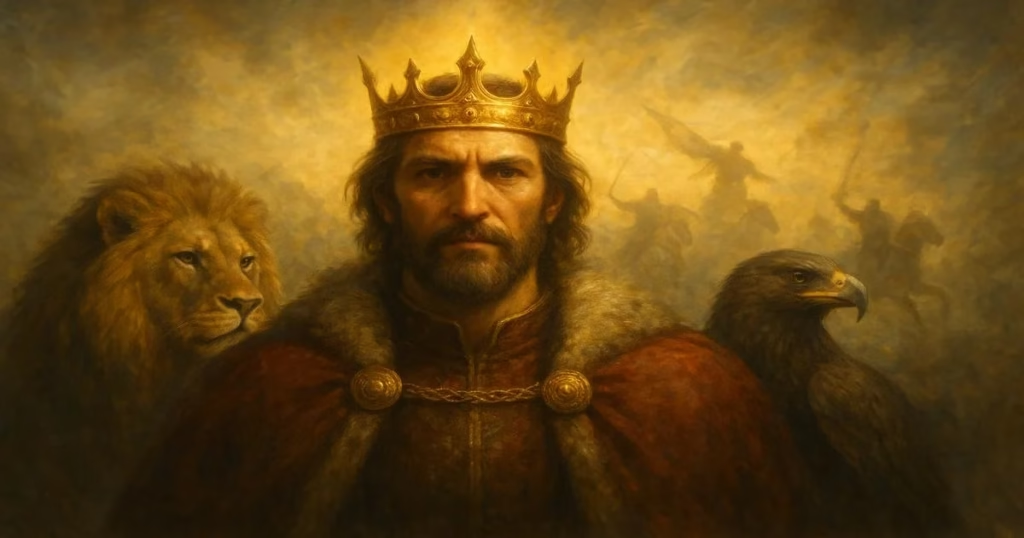
Fun Facts About Medieval Period Kings
To keep it interesting, here are quirky facts on medieval period kings:
- Charlemagne’s Height: Giant for his time, being over six feet tall.
- Richard’s Language: Spoke French, not English.
- Alfred’s Inventions: Made candles for timekeeping.
- Edward I’s Nickname: “Hammer of the Scots” for wars.
- Louis IX’s Relics: Bought Crown of Thorns for a chapel.
These show medieval period kings were human too!
F&Q: Your Questions on Medieval Period Kings Answered
Class, time for Q&A! Here are common questions about medieval period kings.
- Who was the most famous medieval period king? Richard the Lionheart for Crusades, but Charlemagne built a huge empire.
- What did medieval period kings eat? Feasts with meat, bread, wine—fancy but no potatoes or tomatoes yet.
- Were all medieval period kings warriors? Most were, but some like Henry VI focused on religion.
- How did medieval period kings get power? Inherited or conquered, with divine right from God.
- What’s a good book on medieval period kings? “The Plantagenets” by Dan Jones.
These cover basics on medieval period kings!
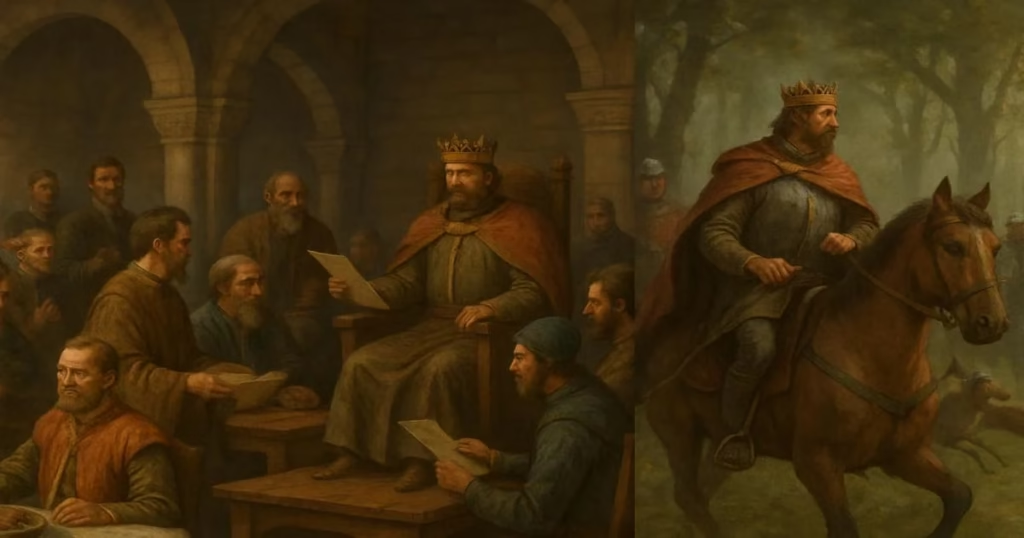
Wrapping Up Our Lecture on Medieval Period Kings
Class dismissed, but what a fun exploration of medieval period kings! From warriors like William to saints like Louis, these rulers shaped our world. If inspired, grab a history book or visit a castle. Share your favorite medieval period king in comments—I’d love to hear! Until next time, keep curious about medieval period kings.


